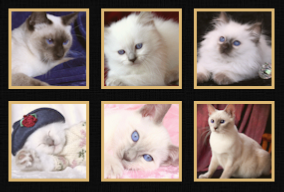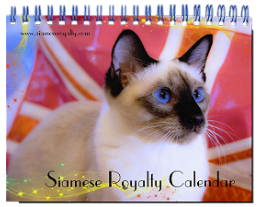

IMAGE GALLERY
ABOUT US
We are a small cattery raising all of our kittens underfoot and lovingly socializing them for their forever homes. We offer some of the most beautiful and sought after Traditional Siamese and Balinese kittens in United States. Kittens leave home tested for FeLV/FIV, vaccinated, parasite treated and come with a Health Contract. Our goal at Siamese Royalty is to raise high-




NEW! 2022 CALENDAR AVAILABLE






Cattery Cost Overview:
Have you ever considered what the costs associated with a good breeding program are? It's hard for the average person to fully comprehend the enormous expenses behind a good breeding program without having had first hand experience. For example, few understand that the greatest challenge for any breeder is the prevention and management of infectious disease, which is often manifested through behavioral problems in a multi-
Expense # 1: Summary of Health and General Maintenance of Breeding Cats & Kittens:
The purchase of a high quality breeding cat must be healthy, without diseases, parasites, or genetic defects. The veterinary testing includes a physical exam, stool exam for parasites, blood tests (FIV, feline leukaemia), proBNP blood test/Cardipet test for HCM & other heart diseases, and it's also wise to do PCR testing for hard-
The purchase of an excellent stud that often sprays requires a well appointed stud quarters. The area needs to be of adequate size, sterile, well ventilated, and naturally lit. This is a very expensive and challenging task. A responsible breeder will want to protect their stud from possible exposure to disease. Additionally, repeating of blood tests must be performed prior to each breeding task. Food, litter, routine veterinary bills, countless paper towels, clean and new bedding, air filters, and other basic maintenance costs will vary depending on the quality of the food and litter, the number of toys and special furniture items purchased for the cat(s) and more. Costs per cat average of $500 per year to maintain one healthy adult cat -
Expense # 2: Registration Fees (plus membership $40 and at least $20 per year thereafter)
The breeder must pay to register the cattery name with at least one cat association (CFA requires $60 to be paid for a five-
Expense #3: Reference Books (about $100 the first year and at least $20 per year thereafter)
The breeder must purchase at least two or three textbooks to help them learn the art of feline husbandry, breeding decisions, veterinary screening, genetic screening, rearing kittens, caring for females in heat, caring for pregnant and lactating females, common feline diseases, feline nutrition, and much much more. Most libraries are unlikely to keep specific books on hand that address these matters.
Expense #4: Kitten Rearing Equipment (about $145 to $230 for first litter and at least $30 per year thereafter, or for every subsequent litters)
The breeder needs special equipment to rear litters of kittens. At a minimum, the breeder needs a heating pad designed specifically to be safe for kittens to keep them warm ($40). Hypothermia is the leading cause of death of young kittens. Also the need for clean bedding, cleaning disinfectants, special urinary enzyme deodorizers to reduce the risk of disease outbreaks ($80), feeding tubes and feeding syringes for weak or sick kittens ($10), KMR kitten formula ($40), kitten litter box, at least two small litter pans made for kittens ($15), an accurate scale to weigh kittens every day ($15 to $100), first aid and kitten delivery kit (latex gloves, rubbing alcohol, Betadine, Kaopectate, syringes, antibiotics, lactated ringers, Albon, Terramycin, Oxytocin, eyedroppers, etc about $300). You must replenish, repair, replace some of the kitten equipment each litter $50.
Expense #5 Advertising: (advertising, breed promotion, networking, about $160 per year minimum, phone calls, and other modes of communication, about $120 per year)
The breeder needs to advertise kittens, to promote the cattery, promote the breed, and network with other breeders. Advertising of kittens can be done various ways, such as pets4you, & CFA cat magazine, this will cost an absolute minimum of $800 per year. Cattery promotion such as, Breeders Referral List & Kitty Sites, involves a form of year-
Expense #6 Diet:
Queens eat twice as much during their pregnancy and up to three times as much while they are nursing kittens. She will need special premium quality food that is approved for pregnancy and lactation. Kittens can die within hours if they are not nursed during the critical hours of birth due to feeding problems. Emergency formula must be kept on hand, along with feeding tubes, and feeding syringes. Kitten formula needs to be made fresh costing anywhere between $20-
Expense #7 Cat Alteration and other Veterinary Care:
Each kitten must be spayed or neutered prior to adoption. This is responsible breeding that prevents new owners from unintentionally failing to neuter kittens in time to prevent accidental litters. Breeders aim to preserve their bloodlines but also want to avoid adding to the number of homeless cats on the streets and in shelters. If you can find a good low-
On the odd occasion, the queen may require a C-
Total Cost per Litter: in best case scenario where all goes well, breeder
does her own vaccinations,and somehow no kitten gets sick = $1000.00
OTHER COSTS WORTH CONSIDERING
Unfortunately, the more cats you have living together, the higher the costs climb. Consider the added wear and tear of the home and furniture due to kittens and cats running amok. Remodeling alone can run into thousands of dollars per year. The cost included in replacing all the carpets with laminate, tiling or hardwood flooring, for example, can be quite significant. Also, take into account the many hours invested into kitten socialization, the sleepless nights spent helping queens deliver kittens, the sometimes necessary tube feeding kittens back to health, the hours spent cleaning litters pans, bedding and feeding bowls. Additionally, added sacrifices are made by staying at home, foregoing family functions and vacations for the sake and well being of our cats.
As breeders we experience many unique and challenging circumstances and expenses unknown to buyers. Consequently, buyers generally do not understand, nor appreciate, the enormous investment reputable breeders make on each kitten when initially confronted with the purchase cost of a kitten. And lastly, the years that it takes to acquire skills and experience that go into a solid breeding program, which equally deserves to be mentioned.
When buying a kitten from a reputable breeder you are helping the breeder cover some the expenses associated with breeding pedigree cats. The buyer's purchase cost not only secures a wonderful high quality pet but the investment also enables the breeder to continue to do all that is required to maintain and even improve the standard for the breed that they work with.
With multiple cats and multiple litters you will, despite the best vaccination and quarantine systems, occasionally end up with illness. Those may be minor or they may be serious, but they have the tendency to cost a great deal of money and time. It's very much like running a day-
Photographs and text copyright reserved @siameseroyalty.com



| Early Alteration |
| Links |
| Young Again & Nuvet |
| Smoke & Pets |
| Health |
| Celebrities |
| Waiting List |
| Cattery Cost |
| Kittens |
| Cat Names |
| Testimonies |
| Testimonies Two |
| Testimonies Three |
| Color Pt Lynx |
| Body Types & Colors |
| Personalities |
| History |
| Past Breeding Cats |
| Available Adults |
| Guestbook |
| TimeLine |
| Store |




